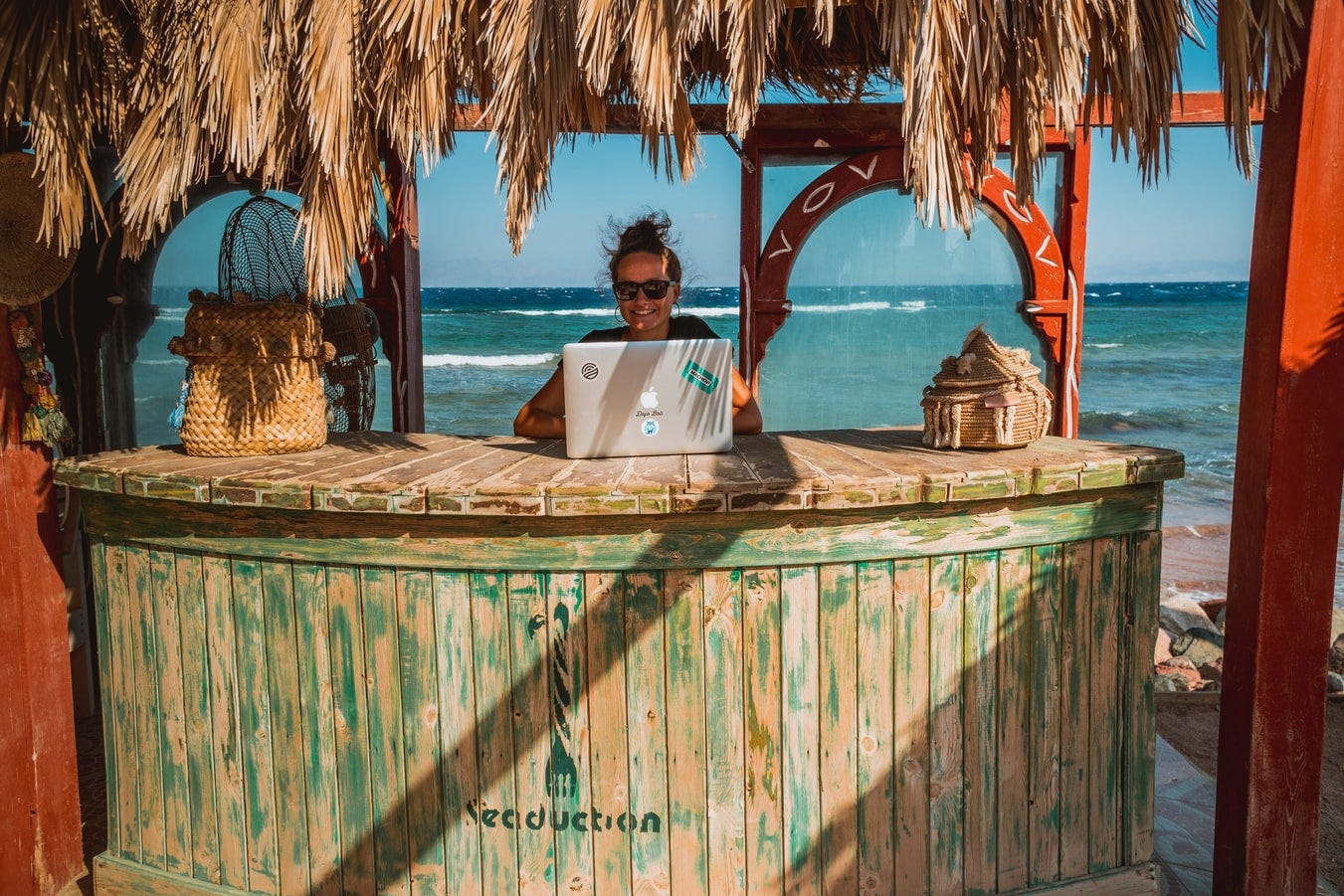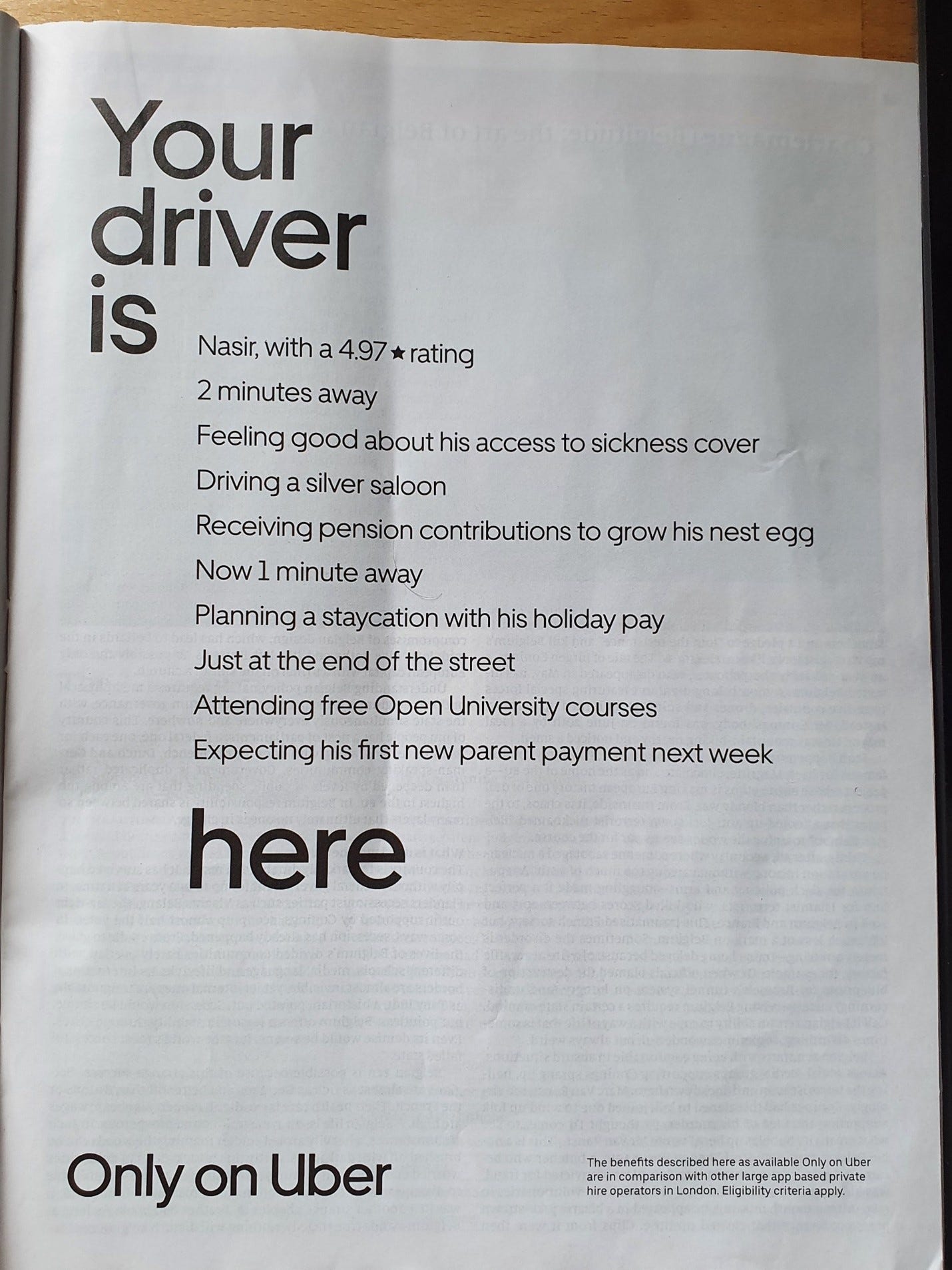Anywheres vs Somewheres and The New Geography of Work
#WF13 Digital Nomads, Gig Economy PR, and Workforce Anthropology Fieldwork
Hi, I’m Andy Spence and this is the Workforce Futurist Newsletter about the rapidly changing world of work.
This is the 13th regular article delivered to your inbox every other week.
If you enjoy the content, please ❤️ above, share with friends, and consider subscribing if you haven’t already 👇
The location of work has changed for half the workforce. When the world opens up again many will join the Digital Nomads because they can work anywhere. Others will need to stay local. This will have big implications for employers, and city economies too. You might be reading Workforce Futurist whilst sitting on a beach (sorry, co-working space) like my friend Simon Horton in Curaçao. Hove beach will do for me when the sun is out😎.
Good luck if your team is still in Euro 2020 or Copa America! ⚽🏆
Anywheres Vs Somewheres
Any discussion on the future of work quickly moves to the future of society and involves politics.
Political power battles are constant across different dimensions, between:
capital vs labour - see Uber’s PR below
those with Covid vaccines, and those without
young vs old - public spending clashes on education or health care
In David Goodhart’s book, “The Road to Somewhere: The Populist Revolt and the Future of Politics”, he adds another political power battle.
In his view, the main fault line in contemporary society is not between right and left, or capitalists and socialists. It’s between the people who see the world from Anywhere and the people who see it from Somewhere. This can help explain recent political events.
The Anywheres are footloose, often urban, socially liberal and university educated.
The Somewheres are rooted in a specific place or community, usually a small town or in the countryside, socially conservative, often less educated.
He cites UK polling evidence to show that Somewheres make up roughly half the population, with Anywheres accounting for 20% to 25% and the rest classified as “Inbetweeners”.
It’s one way to look at society, but what might it mean for the future of work?
Anywhere Jobs
According to a new report, one in five jobs can be classified as 'Anywhere Jobs'.
These include programmers, engineers, and designers and have characteristics that mean they can be done remotely. They estimate that 6 million jobs in the UK can now be classified as anywhere jobs.
This is part of a broader trend where individuals are able to earn outside of traditional employment, using platforms. The report references my essay, ‘Unleashing the Decentralised Workforce’ - a world where solopreneurs can set up digital shops, teachers can teach students remotely, and gamers can earn income by sharing their Fortnite prowess on Twitch.
The New Geography of Work
The ability of millions to work anywhere shapes a new geography of work and has big implications for employers and national and local governments.
The defensive position is that if this type of work can be done anywhere, then it can be moved elsewhere.
In the UK for example, blue-collar work has moved elsewhere in the last 50 years, and now professional white-collar work can be moved abroad.
If you spend 10 minutes looking for a video editor on a freelancer platform, for example, Fiverr, you’ll see what I mean. There is a clear Quality vs Price line you can choose from. There are willing digital workers living in cities from Caracas to Karachi, and from Austin to Albuquerque.
To illustrate, A cybersecurity consultant, Eve, lives in London is building some eLearning and needs support from freelancers.
Working anywhere - Eve chooses an eLearning designer from the platform, Dan. He has 55 good references and can do the work for an agreed price. Dan lives in Bali for half the year, where he also teaches scuba diving and lives in Birmingham for the rest of the year. Eve is pleased with the work and payment is approved - she doesn’t think about where the work was done.
Working somewhere - Eve chooses the best graphic designer on the platform, Valeria. She has 240 great references and her pricing is competitive. Valeria lives in Caracas, where she lives and supports her family. She does graphic design work after her shifts finish in the local supermarket. Eve is pleased with the work and payment is approved - she doesn’t really think about where the work was done.
In this way, digital work can flow easily around the globalised economy.
Over time, this type of work will become more commoditised and it’s harder for those with higher living costs or poor infrastructure such as broadband to compete.
There will be winners and losers as work shifts between the anywheres and the somewheres.
How to Attract Digital Nomads
This has policy implications for a city or country, from a defensive position - trying to reduce work leaving the country, to one that identifies potential opportunities.
How can a country or city attract workers who can work anywhere?
Digital nomads are not new. Over the years I’ve been known to browse Nomadlist for pleasant workspaces and interesting suburbs to explore in Lisbon, Shanghai, or Copenhagen. This community alone has 27,000 remote workers living around the world.
In the Digital Covid era many, work anywheres have found an AirBnB apartment in a new city to work. Examples of established and up and coming locations for Digital Nomads, include Canggu in Bali, Madeira, Cancun, Tenerife, Dubai, Mexico City, Zurich, Berlin and of course Hove Beach.
The ‘Anywhere Jobs’ report makes some recommendations for UK to attract mobile labour which includes:
Strengthening the support infrastructure – such as childcare, transportation, 5G and broadband, and suitable housing and workspaces.
Designing new forms of skills and (re)training - to give employees the softer, interpersonal skills they need to have in order to benefit from technological change and to ease the frictions of moving between different professions.
Renewing the social contract to support more mobile, flexible world of work and to help people become resilient to risk, cope with challenges and attain human capital.
Many of these recommendations will also benefit the somewheres too.
I imagine the factors that make a city attractive to overseas digital nomads are similar to those that make a location attractive for new businesses and tourists.
There might be some factors within the control of the national government, for example, hassle free Visas in Estonia and simple taxation.
At a city level, there might be support for co-working hubs, support for networking and events, training, tax breaks, etc. The Mayor of Miami has shown how to attract workers to an industry niche such as the crypto community. An example is passing legislation to make fee and tax payments in crypto. I’m sure that Miami beach is now a heady mix of investors, libertarians, techies, and altruistic blockworkers.
Some factors are out of our control though, for example, the weather,
Miami 🌞 1 Brighton and Hove ⛅ 0
Gig Economy 2021 - Your PR is Here
The Gig Economy is an easy target with its pantomime villains, infamous cases of exploitation, and highly visible pay rates.
However, for many people, it gives valuable income and lifestyle options.
The interesting question is not whether the gig economy should exist, but how should society respond to it in a fair and equitable way?
I noticed this advert that shows how Uber are trying to reframe peoples’ perception of the gig economy.
Recently Uber has agreed to recognise a trade union for the first time in a landmark deal. The GMB union will have the power to represent up to 70,000 UK drivers in discussions over earnings, pensions, benefits, and their health and wellbeing.
In March the UK Supreme Court ruled that its drivers should be classified as workers - a category entitling them to better pay and conditions. Now Uber provides drivers with a National Living Wage guarantee, holiday pay, and a pension.
So the positive changes in the ad weren’t pushed by Uber, and this is PR, but shows that the industry is having to adapt from pressure from other stakeholders.
The twisting dynamic between platform-based work-matching vs employment law and taxation will take a few more turns in this decade.
If you know anyone in your network who might enjoy this article then please share👇
Workforce Anthropology Fieldwork
watch out for the rise of Workforce Anthropologists as the ‘new Epidemiologists’.
I made this observation in my last article, the loneliness epidemic.
Gillian Tett has written a long article looking at what we lose when we work from home. As you would expect looking through the lens of an anthropologist, the social elements of work are deconstructed into rituals and sense-making.
There are some interesting observations from the engineers who built the internet to those working in Financial Services in New York today.
How much are we missing by giving up the informal, unplanned interactions and rituals that matter most in any work environment?
The bit that’s very hard to replicate is the information you didn’t know you needed
Gillian has also compiled her Top 10 Books of Everyday Social Anthropology. Great reading for the beach Simon, if Amazon delivers there (where is Curaçao btw?)
I found this Q and A with Nathalie Béchet, a Digital Anthropology Researcher at L’Atelier interesting.
My life motto is Marie Curie’s famous quote: “Nothing in life is to be feared, it is only to be understood.”
As part of my fieldwork, I also stumbled upon a workplace Zoom worth joining packed full of behavioural science and workforce experts. Co-hosted by Jomal McNeal and David Gray, called Mosh Pit. You can participate in their weekly ritual every Friday 2.45pm ET.
Back to the Office Bands
And I wonder what the workforce anthropologists will make of this?
When we do eventually get back to the office, our social etiquette will change.
Do we greet our colleagues with an elbow touch, avec une bise 😗, or a bear 🐻 hug?


These colourful bands signal to people what you are comfortable with.
We all have different preferences here.
Steve Browne is a famous hugger.
But NEVER high-five✋ an Englishman!
Some Workforce Futurist articles you might enjoy
This newsletter has been going for 6 months now, there have been 13 regular articles every two weeks plus 3 features. I am still learning what catches my interest, yet alone yours, as this crazy world spins around. I thought I would pull out some articles you might be interested in. And for those who like Top 10 lists, here is one on LinkedIn (who will not promote, or even show articles with links outside the platform 🙈)
How the workforce is changing and what it means for employers:
The Loneliness of the Long Distance Worker - #WF11 How Chinese birth rates and 'visits to the park' impact the future workforce
The Human Stock Market – From Human IPOs to Viva Workforce Technology and Working 5 to 9
The History of Remote Work - A quick look back before we zoom too far into the future
Four Work trends Set to Boom - the 1st regular post from New Years Day - are the trends materialising?
Five Reasons to Be Optimistic About the Future of Work - Are we entering a golden age or will workers be taken for a ride?
For those intrigued by the impact of blockchain and emerging technologies on education and work:
Blockchain and the Decentralised Workforce – Building a new infrastructure of Work
NFTs and the Tokenisation of Work - What crypto creators tell us about the future of work
For those interested in building better organisations:
Zoom Back the Office – A Guide for Leaders - #WF10 - It’s not hybrid work, it’s work
What Will Drive the Future of HR - Organizations need new workforce strategies to succeed (cover article with HR.com strategy report)
How to Improve Workforce Inclusion with Technology - Using an evidence-based approach, with some examples and tips
Five Principles For Using Technology to Build Successful Organisations
More on Workforce Technology:
The New Technology of Teams – How Organisational Network Analysis Can Increase Team Collaboration - (This was 1st part of a series on the technology of teams, with two more in the pipeline - always looking for collaborators…)
The Post Slack Passion Stack - from workplace collaboration tools to crypto creators
The Turing Quest – Using AI to Make Work Better
Let me know if you are working somewhere interesting, on the beach, or otherwise - just reply to this email, or connect on Twitter or LinkedIn.






